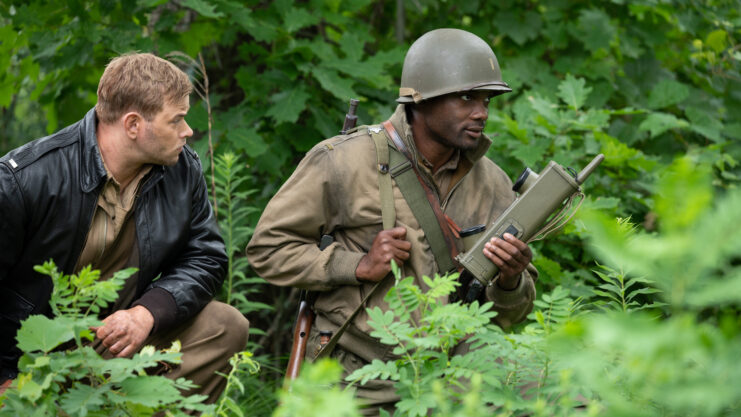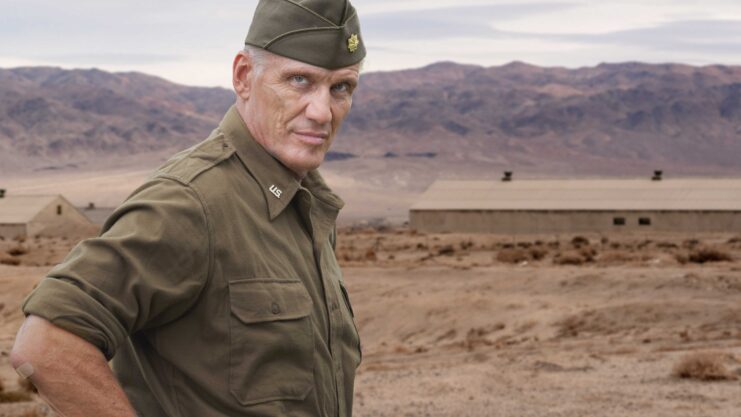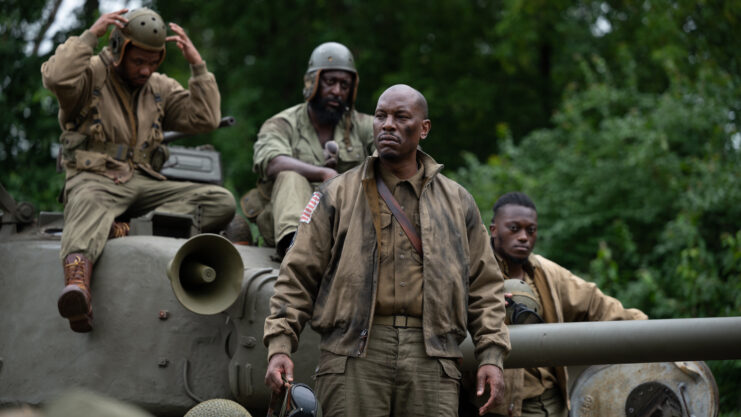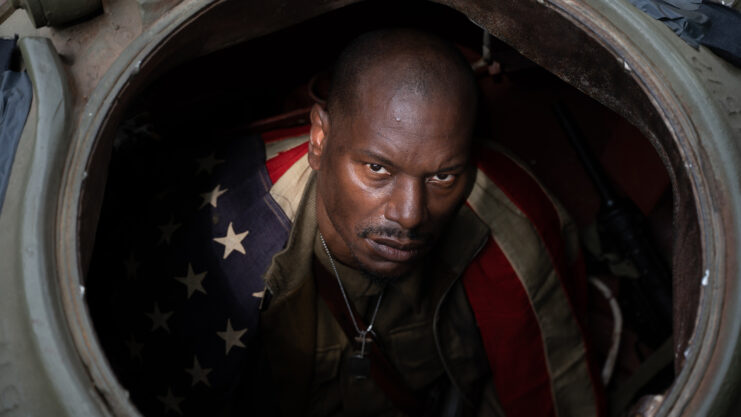INTERVIEW: Director Steven Luke Talks New WWII Film, ‘Come Out Fighting’
Filmmaker Steven Luke is no stranger to bringing World War II-era events to the big screen; over the course of his career, he’s teamed up with some of Hollywood’s finest for such films as Operation Seawolf (2022), Wunderland (2018) and War Pigs (2015). His most recent feature, 2023’s Come Out Fighting, centers around the 761st Tank Battalion – better known as the “Black Panthers” – and their bravery during the conflict.
War History Online recently had the opportunity to sit down with Luke to discuss the movie.

What made you want to make a film about the Black Panthers? They’re not necessarily a unit most focus on when talking about World War II, so what made you want to go in this direction?
STEVEN LUKE: I’m a history major by trade, and I have a specialty in military history. That’s always been one of my fascinations, especially World War I and World War II.
Obviously, as a filmmaker, you try to tell stories, bring stories to life. In the genre of military movies, there’s a lot from World War II, and there just hasn’t been that many stories or movies made about our African-American soldiers and telling a little bit more of their stories. All veterans, they’ll probably say the same thing: they all might be different colors, but they all bleed red.
It’s one of those things that I wanted to [cover], as I was diving into the subject and trying to find unique stories to tell. The Black Panthers and the 761st Tank Battalion [were] on the top of my list of wanting to try to bring some of those characters, some of those moments and some of those stories to life.
How did you go about navigating the racial undertones of the film?
STEVEN LUKE: It’s always a fine line when you’re trying to incorporate stuff from history. I think the best way to do it – and how we mainly do it – is [to] have good discussions with your actors, especially in a genre like this. They can draw on their personal experiences or from things that I observe through history, just establishing what we’re trying to portray and always making sure that everyone is in on that conversation and they know.
It’s much like a team effort and everyone’s onboard. That allows you to dive into really hard, difficult topics. Everyone trusts that everyone working together are really trying to bring something to life. It’s that trust that we all developed together.
Speaking of the cast, how did you gather together such a big-name group of actors? How was it working with them?
STEVEN LUKE: Those guys are all awesome. Some of them, like Dolph [Lundgen], I had worked with in the past on a couple of projects, so I had a little bit more personal experience with him.
Michael [Jai White], Tyrese [Gibson] and Kellan [Lutz] – working with one of my producing partners, Andre Relis, he has made some connections to some of the managers and agents, and we were able to get offers out to them with the script. You never know what the actors like, if it resonates with them, but they really resonated with the part. They really got onboard. I don’t want to say instantly, but once they got the script and they read it, they were in.
[It’s] always nice to have that support from your main cast. They were all awesome to work with. Each one of them have different ways that they approach their acting style. So that’s always key, just finding the right balance as the director to dive into the character together, and making sure you’re both telling, both bringing to life what they want to bring and push the story forward.

Were there instances where they brought something to the character that you hadn’t considered/expected?
STEVEN LUKE: There definitely were instances when they would be like, “Hey, I’m thinking about having my character be more this way.”
Tyrese was a good example. He really wanted to portray a character that was going through loss – he maybe had lost a buddy, maybe someone at home. The actors always bring a certain way that they see the character, and that’s always the best part. I always call it going down the rabbit hole together – you want to do this, that affects how they would say a certain line or how their interactions are with some of the other cast.
That’s the fun part, and that’s also the part where, as a director, you’re really trying to make sure when we make these little small changes based on these character traits that we’re really making sure we stay in the scope of the story that we’re trying to tell. If something changes because of what the character is doing, we make sure to incorporate it and smooth it out throughout the whole story.
How much research would you say went into making the film? As you said, you’re a history major, so you had some basic knowledge of the Black Panthers. But was there any additional research you had to do, or anything you learned that surprised you?
STEVEN LUKE: I spent a good year writing it and researching. How I like to develop a script is really get a basis for [how] the movie might flow and then think what do I need to know to make this better and really research those areas.
I was aware they’re very famous, kind of tied with [George] Patton; they’re a little bit more famous as a tank unit. I was not aware that these guys trained so much. The reason was the Army was trying to figure out how they were going to incorporate these tankers, so while they were waiting to get into battle, they trained and trained and trained and trained.
I think that’s one of the main reasons why these guys were so good when they finally got to the front to fight. I mean, they had some of the best training as a tank unit, so they were very well prepared for what they were about to experience.
I’m sure, for them, it was frustrating to not be able to get into the fight right away. I think [they] really did use that extra time to really hone in their training. It probably saved a lot of lives and also allowed them to be a very unique and dangerous fighting force.
How did you go about making the sets realistic to the time period? Were you able to gain access to military vehicles from the Second World War?
STEVEN LUKE: I’m a big fan of trying to do things as practical as possible, and one of the big things that I just love to try to do is really incorporate period vehicles, I think on this set, I mean, jeez, it might be the most period World War II vehicles, both American and German, that I’ve ever seen assembled in a small budget film.
We had original German tanks – there’s only a handful in the whole country – and we were able to get them to come out and be a part of the movie. We had three different American Sherman tanks, and a couple of Stewart tanks and American Jeeps.
It was a lot of fun to try to assemble these old war horses out of people’s collections. It was a lot of fun to try to assemble them together. Those guys [who] collect those vehicles or restore those vehicles, just seeing them all together. In a movie production, where we’re trying to recreate that time period, it’s a lot of fun to see them in their element.

Was there one you were really excited to have on set?
STEVEN LUKE: I’m sure I’m gonna say this wrong, but it’s a German half-track called a Hanomag. It’s a bigger German half-track that’s a little bit unique, compared to the other German half-tracks that are well-known. We got to have an original one, and it’s really incorporated into the movie because I’d never seen it.
If you’ve seen The Dirty Dozen (1967), at the very end, that’s a Hanomag and the only time I’ve ever seen one in a movie. So I was really excited to get to have one in my movie.
How important was it for you to have those realistic pieces in the film? There are some directors who will go with something similar, but not the real thing.
STEVEN LUKE: For me, it’s super important. I really try to make sure to have as close to an original, or an original, as possible, especially when it comes to the vehicles. I mean, I’ve definitely had to use fill-ins every once in a while, not necessarily in this movie, but in the past.
You just can’t beat the real thing. Half the reason why I like to make these films is to really try to show a younger generation what these vehicles are, or the uniforms or the equipment or what the guys had to experience. So it’s very important to me to try, as much as possible and as much as the budget allows, to get the real thing into the movie.
You’ve worked on a number of World War II-era films. What is it about this part of history that interests you so much?
STEVEN LUKE: I, much like a lot of people, had family serve overseas. I would also say those movies, those time periods, they really were good versus bad types of wars, almost. I don’t want to say bad guys, but you have defined bad guys and defined good guys, so it helps the storytelling process in that way.
There’s so many stories that stem from the war that aren’t told or haven’t been told – you’ll never run out of material.
Is there any other point in history that you’d like to adapt for the big screen?
STEVEN LUKE: Oh, that’s a good question. I’m very fascinated with the expedition into Mexico. I find that time period is just so unique. It’s still kind of a transitional period where they were riding horses, but they had machine guns. It’s like the changeover to what we would consider “modern military” from “old military” in some aspects.
I’m definitely drawn to that area. I would love to do something in that window.

To close out, what would you like audiences to know about Come Out Fighting?
STEVEN LUKE: Please, go see the movie. There’s over 300 people who were directly involved; I’m very proud of it.
More from us: Yousuf Sediq: The Afghan Interpreter and Special Forces Operator Who Fought Against the Taliban
I try to make my movies to be not necessarily family-friendly, but something that a father or dad can take their sons to and watch together and really be able to pick up on the themes of heroism and sacrifice and honor and what it takes. I would definitely suggest that, if you have teenage boys, this will be a great movie and it will be very enjoyable.
The post INTERVIEW: Director Steven Luke Talks New WWII Film, ‘Come Out Fighting’ appeared first on warhistoryonline.
Post a Comment
0 Comments